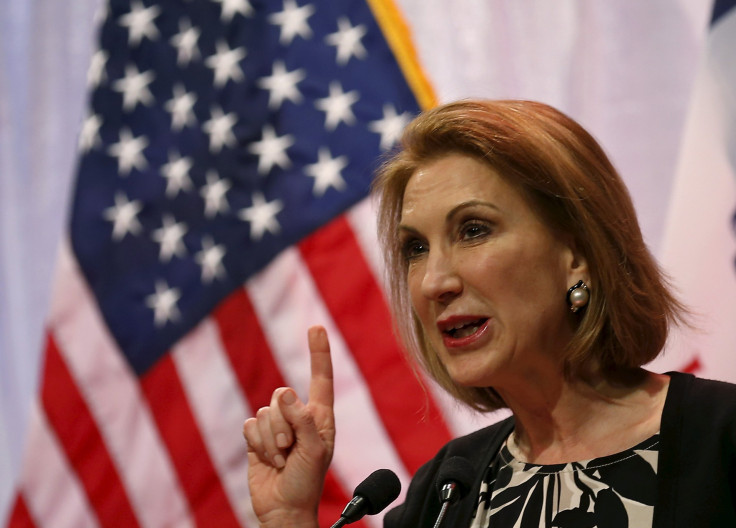Election 2016: What Do Hillary Clinton, Carly Fiorina Mean For Equal Pay For Women, Maternity Leave?

For the first time in U.S. history, two women are running for president, one from each major political party. But while the candidacies of former Secretary of State Hillary Clinton and ex-Hewlett-Packard CEO Carly Fiorina mark a historic high note for gender equality, there's no reason to expect that the 2016 election will give women's issues such as equal pay, childcare and maternity leave a bigger spotlight.
Clinton is the overwhelming frontrunner for the Democratic nomination, while Fiorina, who has never held elected office, is a lower-tiered candidate on the Republican side. As a longtime public figure, Clinton has consistently highlighted the challenges women face globally, while Fiorina has highlighted her business background as her main asset.
“Comparing Hillary and Fiorina is apples to oranges,” said Erin O’Brien, chairwoman and associate professor of the political science department at the University of Massachusetts-Boston. “There’s no sense that [Fiorina is] a real threat in the Republican primary right now. The only similarity is that they’re both women. In terms of their relative position in the party, there’s a vast difference.”
Women have become an increasingly important voting bloc in recent years, making issues that tend to resonate with them more of a focus on the campaign trail. More than half of the voters who headed to the polls in the 2012 presidential election were women, according to the Center for American Progress. Polls suggest women prioritize issues such as healthcare, educational access and income inequality more than men do and tend to vote Democratic at a higher rate.
Women are paid 77 cents on the dollar on average compared to men, according to a 2013 White House study. Meanwhile, more mothers than fathers have reported reduced work hours, taking significant time off, quitting a job or turning down a promotion to take care of a child or family member, a 2013 Pew Research Center report found.
“Those issues are ones that [Clinton’s] base cares about more,” O’Brien said. “Carly Fiorina is trying to win over the Republicans who vote in primary and caucus states,” who tend to be more white, conservative and male.
Equal pay laws have been stymied by Republicans in Congress, including four female GOP senators who gave a variety of reasons for opposing the legislation, ranging from concerns over the costs of lawsuits to small business to women being paid less in some cases because they have more work interruptions to take care of children. Fiorina has also adopted a conservative stance on equal pay issues.
"The single greatest impediment to equal pay for equal work is the seniority system, which pays not on merit and not on performance but on time and grade," Fiorina has written. "And who is it who supports the seniority system? Unions, government bureaucracies, the very constituencies that Hillary Clinton and the Democratic Party represent and which support them."
Her views could be a tough sell for many women voters. “Arguably, Republican women who might be tempted by Hillary could find a home with Fiorina, but the evidence in voting studies is that women just don’t automatically vote for other women,” O’Brien said. “If Fiorina’s running thinking she’ll get the women vote, she will lose.”
Still, at a time when pocketbook issues and global threats are taking more prominence, the election is not going to be decided by where candidates stand on equal pay, according to Jennifer Lawless, a professor and director of the Women & Politics Institute at American University in Washington, D.C.
“My hunch is that the agenda of both campaigns will largely be the same as if they were male candidates, because the issues that matter most to the American people and the issues that matter to the parties right now are the economy and foreign affairs,” Lawless said. “Candidates run first and foremost as partisans, and I think that’s what we’ll see regardless of whether the candidates are men or women.”
© Copyright IBTimes 2024. All rights reserved.






















